 |
| Download pdf file | Newsletter archives | |||
| Dieser Newsletter auf Deutsch | Cette newsletter en français | |||
 |
1. French-German merger: Airbus for rail? |
 |
|
French TGV maker becomes German – "thanks" to China
The new company, Siemens-Alstom will have its headquarters located in the greater Paris region, while the Mobility Solutions' and Signaling division is to remain in Berlin. While officially there is talk of a "merger of equals", Siemens will in fact keep a slight majority share in the joint undertaking and hold six out of eleven seats on the board of directors. For French left-wing politicians and the CGT trade union, this is "scandalous", because the TGV crown jewels of the national industrial property are being sold off "to the Germans". In the past year they had demanded the nationalization of the Alstom group, whose largest shareholder remained the French state, up to 2006.
What roles does government, trade unions and works councils play?
The French government agreed to the de-facto takeover of Alstom, since Siemens will keep its share in the company for at least four years and has accepted social obligations. These include guarantees for no plant closures, no compulsory redundancies and investments in research and development up to the end of 2022. The French minister of economics, Bruno Le Maire, will personally head a working group ("comité national de suivi"), which is to monitor Siemens' obligations towards Alstom together with employee representatives. For Le Maire, it is the state's duty to guarantee "the strategic industrial interests of the French nation". In October 2016, François Hollande, the president at the time, had ordered additional TGV trains for the sum of a half billion €, in order to save the threatened Belfort site (see report in EWC News 3/2016).
The situation is however different in Germany, where it is the trade unions and works councils who are responsible for the monitoring the obligations, and not the government. The IG Metall trade union underlines that management has guaranteed to maintain collective bargaining and codetermination as well as the working conditions. "The supervisory board employee representatives have ensured that the conditions for the merger take into account the interests of the employees". However the social guarantees apply only to Germany and France. Other countries such as Italy and Poland, where Alstom has manufacturing plants, are not covered. Perhaps the two European works councils will succeed in filling in this gap.
Two completely different cultures in the European works council
In Alstom, a "European Works Forum" (EWF) has been in place since 1996. After the sale of its energy division since November 2015 it has only continued to represent one third of the former workforce and its EWC agreement was updated (see report in EWC News 4/2015). The employer is chairman since it is under French jurisdiction. The consultation procedure is described in detail and has been used extensively in practice, including the recourse to external expertise. This is typical for a French EWC, since the EU Directive was strongly inspired by the French model (see report in EWC News 3/2011). Alstom's European Works Forum is to be dissolved in the course of the merger, unless another alternative is negotiated.
In Siemens, there has been a European works council, "Siemens Europe Committee" (SEC), in place since 1995, under German jurisdiction. Although the group is composed of a multitude of divisions and product groups, no European Divisional works councils have ever been established. Instead there are so-called "Cluster-Meetings" for geographical zones in Europe (see report in EWC News 2/2008). The German Group works council is generally the most important instance for the large industrial groups having their head offices in Germany, and the European works council comes only in second place. E.g. it was not at all involved in the signing of an international framework agreement in 2012 (see report in EWC News 3/2012). German EWC bodies have, in general, a lot of room for catching up on the intensive use of consultation rights "à la française".
Brochure on the EWC work at Siemens
General Electric as "blueprint" for a new EWC structure?
A Special Negotiating Body (SNB) was established for General Electric according to article 13 of the EWC Directive, which has until March 2018 to negotiate a completely new EWC agreement for the 95,000 employees in Europe. Up to then, the five existing European works councils (including a temporary body for the former Alstom sites) will continue to operate independently under the umbrella of General Electric. In the future, there may be six European Divisional works councils established with a EWC at the Holding level. This model reminds us of the Airbus example, where there are likewise several Divisional works council (see report in EWC News 1/2015).
Planned structure for General Electric EWC |
 |
2. Legal dispute on consultation deadlines |
 |
|
French Constitutional Council authorizes deadlines for consultation procedures
In the first half of 2015, the employer had informed the works council of their plans to restructure the accounting department. The works council was however unable to render an opinion since the business figures provided were insufficient and therefore started legal action against the company. The proceedings were so slow that no court decision was taken within the legal consultation deadline. As a consequence, the consultation procedure was automatically considered to be terminated. The works council is claiming that it has been deprived of its rights due to the unsatisfactory functioning of the judicial system.
Background: new legal consultation deadlines
Since 1 January 2014, a modified consultation procedure applies to French works councils. The Labour Code defines fixed deadlines, thus enabling a faster implementation of restructuring (see report in EWC News 1/2014). The opinion rendered by a works council is of high legal significance, since the employer must wait for it before implementing any measures. There would otherwise be the risk of these being blocked or prohibited through a court injunction order, sometimes even for several years, as in the case of the US company Goodyear (see report in EWC News 4/2009). Since 2014, a consultation procedure is considered to be concluded, if the opinion of the works council has not yet been rendered before the end of the deadline. A request may however be made to the labour courts to extend the deadline, providing there is a good reason. According to the legislation, the courts must make a decision on this request within eight days. In the present case however, the courts took more than three months and the deadline for the works council had in the meantime expired.
The case could end up in the European Court of Justice
A hot topic also for European works councils
The EU Directive on European works councils is closely tailored around the fundamental philosophy underlying the French consultation model. However it does not prescribe any fixed deadlines for the rendering of an opinion. On the other hand, it still remains unclear what the legal consequences are when no opinion is rendered. In France the Court of Cassation ruled in favor of an injunction order in 2008 (see report in EWC News 1/2008). Up to now, there have been no Supreme Court rulings on the matter in Germany and the United Kingdom, since all litigations have been settled out of court (see report in EWC News 1/2016).
Constitutional Council website Background info: The flow of a correct consultation procedure
Forthcoming event
There will be a focus on current developments in French labour legislation during the EWC Academy's Hamburg conference on 29 and 30 January 2018.
|
 |
3. Competing collective agreements - no clear picture in Europe |
 |
|
German law on collective bargaining unity from 2015 is constitutional
The provisions of the law on collective bargaining unity are largely compatible with the Constitution according to a ruling of the Federal Constitutional Court in Karlsruhe from 11 July 2017. In Germany since July 2015, the collective agreement signed by the majority union having the most members is the only one that is applicable in companies with several trade unions. The law should simply undergo certain improvements before the end of 2018, in order to appropriately take into account the interests of specific professions or industries.
The initiative for legislation arose as a result of labour disputes organized by small trade unions in the transport sector (e.g. in German railways) in defense of specific interests and against the large trade unions. The law on collective bargaining unity once again restored the legal situation which prevailed as such until 2010. At that time, the regulation in force since the Second World War according to which only one collective agreement is applicable in each company was discarded by the Federal Labour Court in Erfurt (see report in EWC News 2/2010). The matter led to a controversial debate in Germany, even though many other European countries - including those with trade union pluralism - exclude competing collective agreements by law (see report in EWC News 4/2014).
The Civil Service Federation does not agree with the court ruling and is considering filing a case before the European Court of Justice for Human Rights. In April 2014, the court had to rule on restrictions to the right to strike in Britain dating from the Thatcher years and had rejected a complaint from the RMT trade union. The judges explicitly granted a degree of discretion to the legislator for implementing the human right to strike (see report in EWC News 2/2014).
Federal Constitutional Court press release
Belgian Railways' law on collective bargaining unity from 2016 unconstitutional
The complaint was filed by the independent railway trade union SIC, which would have been excluded from works council elections and collective bargaining, since it does not belong to one of the three large confederations. According to the constitutional judges this would cause an exceptionally grave prejudice to the freedom of association and to the principles of democracy. For small trade unions the ruling means that they may organize strike action independently. In Belgium only the socialist, the Christian and (left-wing) liberal trade union confederations are representative on the national, cross-industry level. They are also represented in the National Labour Council, where they advise government together with the employers' associations and conclude universally applicable collective agreements. The EWC Directive was also transposed in Belgium in this manner (see report in EWC News 1/2011).
Preparations for a law on collective bargaining unity in Sweden
The APM Terminals company is subject to LO's industry-wide collective agreement and therefore refuses to conclude any in-house agreement to the contrary with the independent grassroots trade union. The suggestion to establish a joint negotiating committee with both trade unions was rejected by LO. There have been on-going strikes since April 2016 and in May/June 2017 parts of the workforce were locked out. APM Terminals now plans to dismiss 150 of the 450 employees due to the drop in container business resulting from the labour dispute.
The situation in Gothenburg is causing a major political stir throughout the whole country. The employers' association of port operators has started a campaign against the independent dockworkers union and in all Swedish ports is only willing to cooperate with LO. The red-green government is working on new legislation which will prevent employers who have already concluded a valid collective agreement from being pulled into labour disputes. The situation is comparable to the strikes in the German Railways which finally led to the German law on collective bargaining unity in 2015.
Grassroots trade union information page |
 |
4. Landmark judgements of the European Court of Justice |
 |
|
German codetermination is conform with EU law
Court of Justice press release Report on the ruling from Hans Böckler Foundation
The court case triggered a heated debate within trade unions in Germany, since it represented a real risk for the future of codetermination, which has been an integral part of the social model since the Second World War. In Germany one third of the seats on the supervisory board must be reserved for employees in all companies starting from 500 employees and even one half of them starting from 2,000 employees. However for some years now, German codetermination has gradually been put under pressure. The legal form SE (European Company) and other foreign legal forms are increasingly used to restrict the influence of employee representatives on the supervisory board or to completely avoid any type of codetermination. A legislative initiative has been underway since February 2017 which aims at stopping its progression (see report in EWC News 1/2017).
Background information from German Trade Union confederation Interview with two labour lawyers Report on a conference in Luxembourg
Ryanair loses before the European Court of Justice
The judges in Luxembourg have however left open the issue of which national legislation is applicable. They ruled only on the court's competence. In 2013, there were contradictory judgements for Ryanair in several European countries. As such, a local Belgian labour court at Charleroi airport declared itself as incompetent, whereas a Norwegian court declared itself competent. In Marseille the public prosecutor wanted to confiscate four Ryanair planes, because no social insurance contributions had been paid in France (see report in EWC News 4/2013).
Court of Justice press release Statement from the International Transport Workers' Federation |
 |
5. London judges uphold workers' interests |
 |
|
Cleaning manager at Goldman Sachs enforce EWC landmark court decision
These figures are necessary, so that employee representatives may examine whether the company falls within the scope of the EWC Directive and to start establishing the EWC when appropriate. There had never been a court ruling on the subject in the United Kingdom. The European Court of Justice rulings from 2001 to 2004 which were fought out by German works councils (Bofrost, Kühne + Nagel as well as ADS Anker cases) played an important role hereby. With these in mind, the CAC ruled fully in favor of the plaintiff and fixed a 28 day deadline for the company to provide all the information. Facilicom has 28,000 employees in the Netherlands, Belgium, France and the United Kingdom. In the meantime they have started to establish the Special Negotiating Body.
Facilicom is responsible for cleaning the offices of Goldman Sachs the US Investment bank in the City of London. The plaintiff has worked there for eleven years as cleaning team group leader and is a militant member of the trade union Unite, for which he has participated in organizing campaigns in Ghana and for the "United Migrant Workers Education Project". Goldman Sachs is considered to be the breeding ground for international financial capitalism with a far-reaching political influence. The presidents of the European Central Bank and the Bank of England, several US Secretaries of the Treasury, the Italian prime ministers Monti and Prodi as well as economic advisers from Thatcher to Merkel have all stood on the pay roll of Goldman Sachs. Some of them have almost certainly held meetings together in nice and tidy conference rooms, cleaned under the responsibility of the plaintiff.
Further information on European Court of Justice Rulings
German Discount chain loses in third instance ruling in London
In the ballot, if more than 50% of the workforce in Bridgend vote in favor of the trade union GMB, then there will be a statutory recognition of employee representatives and bargaining rights for GMB in this "bargaining unit". This would be the first step in organizing the total workforce of 18,200 Lidl employees in Britain. In September 2016, GMB had already started a campaign in the Lidl distribution center in Runcorn near Liverpool. Such a persistent refusal to recognize any form of workforce representation is to be found less and less often in British companies, since there has been a legal entitlement since 2000. In practice there are usually "voluntary" regulations to avoid any court decision. The legal regulations ("compulsory trade union recognition") applies only to a minority of cases, i.e. particularly to anti-union oriented companies. Noteworthy is that more and more often these include German companies. As an example, the publishing house Macmillan, part of Holtzbrinck Group, was the very first company in Britain in 2007 who had to pay a fine for violating minimum employee representation standards (see report in EWC News 2/2007).
Press report on the court ruling GMB website for Lidl employees Report on the campaign near Liverpool
Court fees for British employees illegal
The High Court judges consider the fees of up to 1,200 £ for the first instance and 1,600 £ or more for the second instance as "incompatible with access to justice", since this in particular prevents people with low incomes from taking court action. Following the introduction of tribunal fees, the number of court cases for unfair dismissals sank by around 73%, and for discrimination based on gender, by around 90%. Beforehand there were 16,000 court filings every month against unfair dismissal, thereafter only 7,000. Since April 2014, (free) conciliation by ACAS is compulsory in individual labour law and only thereafter can court action be taken. ACAS is financed as a public institution by the government (see report in EWC News 3/2014).
Unison trade union press release Effects of the ruling in Scotland |
 |
6. Newly established European works councils |
 |
|
French agricultural cooperative establishes EWC
In the future, 29 delegates will represent the 5,500 employees in Europe, including 4,000 in France. The twenty French seats were assigned to the four trade unions represented in the company, including seven seats for the CFDT and six for the CGT. Three seats were allotted to Czechia, where Tereos possesses the country's largest sugar and alcohol producer, which originally belonged to the Princely House of Thurn and Taxis. Further representatives come from Belgium, Spain, Romania and the United Kingdom. Italy and Germany have less than 100 employees and therefore no seats. All EWC members must have a trade union mandate or be a member of an employee representative body in their home country.
The employer is chairperson since it is a French agreement. There is no steering committee but the EWC members elect a secretary and one deputy. Both have a monthly ten hour time-off work allowance and the remaining EWC members twelve hours per year. The time for the two annual meetings, which are always organized near a Paris airport, is not included in this allowance. Training is provided if necessary and paid by central management. The new standards of information and consultation have been fully integrated. The EWC may be advised from a chartered accountant, who has a strictly defined timeframe for requesting documents from central management. A written report must be submitted within three weeks before the EWC meeting. The EWC may be assisted by a European trade union federation and if necessary by further experts.
A EWC agreement was signed for the Swedish paper manufacturer Essity, on 30 May 2017 in Stockholm. The company was spun-off from the SCA group only a few days later, on 15 June 2017, and launched on the stock market. Medical products have also now been added through the acquisition of BSN medical from Hamburg. Essity has 48,000 employees worldwide and stands behind brands such as Tempo and Leukoplast. With 4,250 employees, Germany represents the largest country in the EU. The SCA group has since then, been focusing on forestry products and has taken over the ownership of the entire forestry assets.
The Essity EWC agreement could be negotiated within a short timeframe, since there had been experience with European works councils already in former companies since 1995. Between 2009 and 2013 the German subsidiary, SCA Hygiene Products, was operating in the European Company (SE) legal form with a full-parity supervisory board. They did not establish a SE works council but instead these sites continued to be represented in the EWC of the Swedish holding (see report in EWC News 3/2009). In 2012, the European operations of the US company Georgia-Pacific were acquired and SCA's packaging division was sold to the British group DS Smith. These were accompanied by intensive consultations of both European works councils (see report in EWC News 1/2012).
Two European divisional works council
As previously in the SCA group each division of Essity has its own council: one for paper and another for hygiene. Both divisional works councils meet twice annually and elect their own steering committees with three to five representatives from different countries. They hold meetings with management four times per year, of which two are by video conference. Both committees combined together establish the Holding's steering committee. An intercultural training lasting a whole week is organized once per year without interpretation. All EWC members have a right to intensive English courses, including up to five weeks individual participation to seminars abroad.
The EWC agreement explicitly promotes the establishment of employee representation in all countries where it does not yet exist. Furthermore, employee representatives from sites concerned by restructuring can be invited at any time to EWC meetings. The appendix to the agreement includes a chart specifying exactly on which topics information and consultation procedures are to be carried out and with which level of the European works council.
Description of a project from Mannheim works council
British media group establishes EWC under Dutch jurisdiction
A three-day plenary meeting is held each year in Amsterdam. The EWC elects a chairman and four other members to establish the select committee. These must include one employee representative each from the Holding, from a British subsidiary, and from the remaining Western and Eastern Europe. The select committee holds a quarterly telephone or video conference with central management. The EWC members have a right to one day of training per year. Consultations are carried out ad-hoc with the select committee or a special working group of the EWC, for example if mass redundancies or plant relocations are planned. Central management can hereby fix the duration of the consultation procedure.
Blatant contradiction to the EU Directive
The transnational competence of the EWC has been restricted to an exceptionally large extent. If central management in London makes a decision which concerns only one country in continental Europe, then the EWC is explicitly not to be involved. Furthermore, for the purpose of the EWC agreement, the UK and Ireland are considered as only one country and the same applies to Austria and Switzerland. In Eastern Europe at least three countries must even be affected by a measure, before the EWC can be involved. Liberty Global therefore represents one negative example across the whole of Europe, since there has not yet been any other company with such major restrictions. The text clearly contradicts recitals 12 and 16 of the EU Directive's preamble (see report in EWC News 1/2013) and would probably not pass verification by the courts. |
 |
7. New SE participation agreements |
 |
|
Dodging codetermination from Mannheim via Liechtenstein to Europe
The Special Negotiating Body signed a SE participation agreement on 6 December 2016 in Mannheim. In the future the SE works council will replace the European works council, which was already established in 1996 on a "voluntary" basis and has been under German EWC jurisdiction since 2001. The SE works council has 35 members from 19 countries plus one guest delegate each from the EU acceding countries, Macedonia, Montenegro and Serbia. The largest countries; Germany, the United Kingdom, the Netherlands and Norway have four mandates each. Furthermore, the United Kingdom is to remain represented in the SE works council following the Brexit.
The seven member steering committee meets three times annually. Plenary meetings are held twice per year. There are up to two consultation meetings for any restructuring, however the whole procedure must be terminated within eight weeks at the latest. Only then can central management implement any planned measures e.g. proceed with redundancies. A full-parity arbitration board is established to resolve any disputes.
Building and Real Estate Company avoids full-parity supervisory board
The SE agreement freezes supervisory board participation to the current level of one-third (two out of six seats for the employees). A full-parity supervisory board will therefore not be established should the threshold of 2,000 employees in Germany, which is legally prescribed for German companies, be exceeded. Since acquisitions were already made immediately following SE registration, time was apparently running short. The SE works council, which is called the European Employee Forum, is composed of three members: two from Germany and one from Luxembourg. For the first term of office the representatives for the Employee Forum and the supervisory board were nominated by the Special Negotiating Body. At the end of the first term of office a pan-European general election will be held for the entire workforce, in a similar way to the agreement for the seed manufacturer KWS Saat, in 2015 (see report in EWC News 3/2015). In the same industry the property development company Inros-Lackner from Rostock was also converted into an SE in 2013 (see report in EWC News 4/2013).
Press release on SE conversion Full text of the conversion plan
Codetermination avoided thanks to mini-workforce in Luxembourg
The Special Negotiating Body (SNB) was composed of ten German employees. The ver.di trade union as well as the employees from Luxembourg had both waived their rights to a mandate. The future SE works council has eight representatives from Germany and one from Luxembourg, who then elect a three-member steering committee. The only difference in competence between the German national works council (KBR) and the SE works council are the six employees in Luxembourg. In order to avoid duplicating work, the KBR may transfer its participation rights to the SE works council. For restructuring, the consultation procedure ends after three weeks but can be extended by 14 days, on request of the SE works council.
Press release on SE conversion Full text of conversion report (see starting from page 43) Legal blog on avoiding codetermination through the SE legal form |
 |
8. European works councils strengthen their influence |
 |
|
British packaging and recycling company sets standards
Socially responsible measures in redundancies and anticipation of change had already been integrated into the EWC agreement in 2013. Occupational health and safety, skills development, non-discrimination as well as environmental standards in production have likewise been integrated into the agreement, which is very rare for British companies. The DS Smith EWC agreement is therefore considered to be one of the best in the United Kingdom (see report in EWC News 1/2013).
Report on a trade union meeting at DS Smith
Forthcoming event
The chairman of DS Smith's European works council will give a report on the charter during the Hamburg conference organized by the EWC Academy on 29 and 30 January 2018.
Italian insurance company promotes teleworking
As a result of this joint declaration, the EWC is now able to ensure a social framework for the introduction of teleworking in countries where employee representation is weak. The relevant factors were highlighted in the joint declaration by the European social partners in the insurance sector from February 2015, which will now apply to Generali. These include its voluntary character, employment conditions, frequency, health and safety, data protection, right of access to the tele-workplace for works councils, equipment for the teleworker, training and career development, accident insurance coverage, collective rights of the teleworker.
Full text of the European declaration on teleworking Presentation of EWC on Generali website
Generali's EWC agreement was last adapted to the standards of the new EWC Directive in 2012 (see report in EWC News 3/2012). The French Axa insurance group is currently also running a comprehensive consultation procedure with their European works council on the digital transformation (see report in EWC News 2/2014).
French railways updates EWC agreement
The information and consultation catalogue has been extended in the new agreement with additional topics e.g. fundamental changes to the organization, introduction of new working methods, downsizing or closure of business premises. For the first time EWC members have a right of access to all subsidiaries in Europe. The employer bears all the costs incurred for meetings, interpreters, training courses and experts and in addition the EWC receives its own budget which has been increased from 8,000 to 20,000 € per year. There is a provision for eight days training per term of office and the time-off work allowance for each representative in addition to the time for meetings, has been increased from 60 to 80 hours per annum. EWC board members have higher allowances.
The number of members has increased from 26 to 28 and for the first time Poland and Norway are represented in the EWC. Although France counts for almost 90% of the 235,000 strong European workforce, the country had to forgo one seat (from ten to nine), since the percentage of the foreign workforce is growing. Sweden, is the second largest country with 6,900 employees where the SNCF operates numerous municipal bus lines and Stockholm's underground. With eurobahn in Germany, the SNCF is the largest local transport operator in North Rhine-Westphalia after German Railways. |
 |
9. The view beyond Europe |
 |
|
Prevention of sexual harassment in the workplace
Full text of the Joint Commitment
Discussion with the management over global personnel policy
Full text of the framework agreement
British on-line retailer reinforces social responsibility
Report on the signing of the ASOS agreement Berlin court press release for Zalando case |
 |
10. Interesting websites |
 |
 |
11. New publications |
 |
|
Study on work-related stress in four countries
The Academy of the European Confederation of Independent Trade Unions (CESI), in Brussels published a study on occupational health and safety in March 2017. It focuses on psychosocial stress which is on the rise as a result of the use of new technologies in the working environment. Besides presenting the legal EU framework, the study also includes the results of interviews carried out in public administrations in Italy, Spain, Belgium and Germany. The brochure is available in five languages. CESI is the second largest umbrella confederation at the European level after the European Trade Union Confederation (ETUC). In Germany, the Civil Service Federation is affiliated to it and with its 1.3 million members is competing with the 6.1 million members of the German Trade Union Confederation (DGB).
Further information on the project
Cultural insight into twelve European countries
An intercultural handbook was published in May 2017, which not only covers country-specific cultural characteristics but also deals with the perception of human rights and corporate social responsibility within the different cultural backgrounds. Apart from the historical background, which is often evoked to explain cultural differences, there are also practical examples from companies in each of the 22 selected countries, for which there is a description of problematic situations between people of different cultures arising in everyday working life. Twelve of the country studies deal with Europe. In Scandinavia, Denmark, Sweden and Norway are treated separately. The Mediterranean countries include France, Spain and Greece. From Eastern Europe, Bulgaria and Romania are represented, along with Russia and Ukraine. For England and Scotland there are separate country studies.
Further information on the handbook Table of contents with sample preview
Brexit, a stroke of luck for Continental Europe?
The decision of the British to abandon the European Union is contributing to strengthening cohesion between the remaining countries. This has been demonstrated by a survey carried out by the Friedrich Ebert Foundation in August 2017, in which voters in eight countries were asked their opinion on the EU. Compared with a survey from 2015, appreciation of the benefits of the EU has considerably grown in Germany, France, Italy, the Netherlands, Spain, and Sweden as well as in Czechia and Slovakia. The number of those, who consider EU membership as an advantage for their own country, has grown in all eight countries. In contrast to 2015, for the majority, the EU now stands for "an opportunity" rather than "a risk" and for "stronger" rather than "weaker prosperity". The readiness to shift power from the national to the European level has also risen in all these countries.
What consequences does the Brexit have for European works councils?
Works councils and financial analysis
In August 2017, the Association of Austrian Trade Union Education (VÖGB) published a new brochure, which enables works councils to better comprehend the economic situation of their company. The authors from the business consulting department in the Chamber of Labour in Vienna, are of the opinion that it is not sufficient just to "read" the end-of-year financial statements. Instead key economic figures such as EBIT and cash flow should be analysed, and their progression interpreted and examined in relation to other economic indicators such as turnover and staff costs. Different accounting strategies used to optimize taxation or to counter the demands of the workforce or works councils are also described. The brochure provides basic knowledge on the most important issues and represents a first introduction into a subject, which European works councils are confronted with at least once per year in their plenary meetings.
Further brochures on the subject |
 |
12. The EWC Academy: Examples of our work |
 |
|
Data Protection Seminar in Mainz
Dates, program and registration form
A conference focusing on the USA was held for the fifth time from 18 to 20 September 2017. Apart from industrial relations, it covered in particular the current situation following presidential elections. One of the speakers was Hermann Nehls, who, until a few weeks ago was working at the German Embassy in Washington as labour, health and social affairs counselor. The conference was held in Harnack House in Berlin which was built in 1929 and served for many decades as an officers' club for the US armed forces and nowadays for scientific events. The next US conference is planned for autumn 2018.
Two US companies following their merger
With support of the EWC Academy, a rapid and non-bureaucratic solution was found and the establishment of a Special Negotiating Body (SNB) according to article 13 of the new EU Directive, could be avoided. The new EWC agreement provides substantial improvements and is to be signed in the next plenary meeting at the end of November 2017. The enlarged EWC will then presumably start operating in spring 2018. While B/E Aerospace had not previously had a European works council, Rockwell Collins had already had experience with a European Forum since 1996, under British jurisdiction. The EWC has been operating since 2014, under the jurisdiction of Luxembourg (see report in EWC News 1/2014).
Training for newly established SE works council
|
 |
13. Current seminar schedule |
 |
|
The EWC Academy and its forerunner organization have been holding conferences and seminars for the members of European works councils, SE works councils and Special Negotiating Bodies since January 2009. So far, 740 employee representatives from 268 companies have taken part including many of them for several times. This represents around 21% of all transnational works council bodies in Europe. In addition there are numerous in-house events and guest lectures given to other organizations.
Overview of forthcoming seminar dates
Shared service centres in Central and Eastern Europe
One-day seminars on new EU General Data Protection Regulation
Dates, program and registration form
This seminar can be booked also in-house
In May 2017 we organized this seminar for all German works council members of the US telecommunications company Verizon in their offices in Frankfurt. We will also be happy to organize this seminar off-site, on request e.g. in Hamburg.
10. Hamburg conference for European and SE works councils
Current trends in the EWC landscape with practical examples as well as the current situation in France following presidential elections
Short seminar on employee representation in France or short seminar on the new EU General Data Protection Regulation (optional)
Review: Report on the Hamburg conference in 2012
In-house events
|
 |
14. Imprint |
 |
|
EWC News is published by:
|
 The German ICE and the French TGV currently represent the world's two leading high-speed train technologies. They are however coming under competitive pressure from China, where the world's largest rail-vehicle manufacturer was founded following a merger in 2015. On 26 September 2017, it was announced that the ICE manufacturer Siemens Mobility and Alstom, the TGV maker are to merge by the end of 2018. Both are of a similar size and have altogether 60,000 employees. The entire group is concerned for Alstom whereas for Siemens, the merger only involves their Mobility division.
The German ICE and the French TGV currently represent the world's two leading high-speed train technologies. They are however coming under competitive pressure from China, where the world's largest rail-vehicle manufacturer was founded following a merger in 2015. On 26 September 2017, it was announced that the ICE manufacturer Siemens Mobility and Alstom, the TGV maker are to merge by the end of 2018. Both are of a similar size and have altogether 60,000 employees. The entire group is concerned for Alstom whereas for Siemens, the merger only involves their Mobility division. In 2014, Siemens wanted to sell its rail technology to Alstom in return for the acquisition of their Energy division. The race for their Energy division was however won by the US conglomerate General Electric. Alstom's European works council had previously fought out commitments from management on socially responsible downsizing - a complete novelty for a US company, but which was only achieved under the threat of legal action (see
In 2014, Siemens wanted to sell its rail technology to Alstom in return for the acquisition of their Energy division. The race for their Energy division was however won by the US conglomerate General Electric. Alstom's European works council had previously fought out commitments from management on socially responsible downsizing - a complete novelty for a US company, but which was only achieved under the threat of legal action (see  On 3 August 2017, the Constitutional Council in Paris ruled on an emergency court appeal from the social chamber of the Court of Cassation on the question whether the deadlines for works council consultations which have been legally defined since 2014, are constitutional or not. The Constitutional Council can be compared to the Federal Labour Court in Germany. The court action was initiated by the works council of the US company Markem-Imaje, a supplier for product identification in the packaging industry based near Valence on the Rhône with 700 employees in France.
On 3 August 2017, the Constitutional Council in Paris ruled on an emergency court appeal from the social chamber of the Court of Cassation on the question whether the deadlines for works council consultations which have been legally defined since 2014, are constitutional or not. The Constitutional Council can be compared to the Federal Labour Court in Germany. The court action was initiated by the works council of the US company Markem-Imaje, a supplier for product identification in the packaging industry based near Valence on the Rhône with 700 employees in France. The CFDT and CGT trade unions as well as the central works council of the electricity supplier, Électricité de France were also involved in the proceedings before the Constitutional Council. They were supported by law professor Antoine Lyon-Caen, who comes from a family dynasty of top left-wing lawyers from the 19th century and is currently head of EHESS, the elite School for Advanced Studies in the Social Sciences. The court's conclusions referred to the Constitution of 1946 and the Declaration of Human Rights of 1789. The Constitutional Council examined the legal text, not the functioning of the justice and ruled the consultation deadlines to be constitutional. There could however be infringement to European law, since EU Directives, such as the one on Information and Consultation, must be transposed in such a manner so that they can effectively achieve their intent ("effet utile" or useful effect). The European Courts may therefore soon have to deal with this fundamental principle.
The CFDT and CGT trade unions as well as the central works council of the electricity supplier, Électricité de France were also involved in the proceedings before the Constitutional Council. They were supported by law professor Antoine Lyon-Caen, who comes from a family dynasty of top left-wing lawyers from the 19th century and is currently head of EHESS, the elite School for Advanced Studies in the Social Sciences. The court's conclusions referred to the Constitution of 1946 and the Declaration of Human Rights of 1789. The Constitutional Council examined the legal text, not the functioning of the justice and ruled the consultation deadlines to be constitutional. There could however be infringement to European law, since EU Directives, such as the one on Information and Consultation, must be transposed in such a manner so that they can effectively achieve their intent ("effet utile" or useful effect). The European Courts may therefore soon have to deal with this fundamental principle.
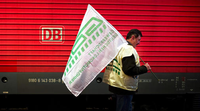
 On 26 July 2017, the constitutional court in Brussels decided that parts of the law concerning the administration and employees of the national railways company dating from 2016, are unconstitutional. It has ruled that as of 2018, for the first time works council members are to be elected as in the private sector. So far the relative strength of the unions is based on membership figures. Now they are to be based on the results of works council elections, as is already the case in France since 2009 (see
On 26 July 2017, the constitutional court in Brussels decided that parts of the law concerning the administration and employees of the national railways company dating from 2016, are unconstitutional. It has ruled that as of 2018, for the first time works council members are to be elected as in the private sector. So far the relative strength of the unions is based on membership figures. Now they are to be based on the results of works council elections, as is already the case in France since 2009 (see  Container handling in the port of Gothenburg has declined in the first half of 2017 by around 22%. This has been caused by a labour dispute that has been brewing between trade unions competing for collective bargaining rights in the container terminal of APM Terminals. Gothenburg is Scandinavia's largest port and half of all Swedish containers are handled there. 85% of all dockworkers belong to an independent grassroots union, which had split from the transport workers' trade union affiliated to the LO confederation, in 1972.
Container handling in the port of Gothenburg has declined in the first half of 2017 by around 22%. This has been caused by a labour dispute that has been brewing between trade unions competing for collective bargaining rights in the container terminal of APM Terminals. Gothenburg is Scandinavia's largest port and half of all Swedish containers are handled there. 85% of all dockworkers belong to an independent grassroots union, which had split from the transport workers' trade union affiliated to the LO confederation, in 1972. On 18 July 2017, a small shareholder of the tourism group TUI failed in his attempt to eradicate employee codetermination rights on the supervisory board before the European Court of Justice in Luxembourg for infringement of EU legislation. His reasoning was that since only the workforce in Germany has the right to vote for the supervisory board, then the other countries are disadvantaged. In actual fact, 40,000 foreign employees are excluded from codetermination within TUI, and only 10,000 employees in Germany benefit from it. In October 2015, the Court of Appeal in Berlin had requested the European Court of Justice to set a legal precedent on this question (see
On 18 July 2017, a small shareholder of the tourism group TUI failed in his attempt to eradicate employee codetermination rights on the supervisory board before the European Court of Justice in Luxembourg for infringement of EU legislation. His reasoning was that since only the workforce in Germany has the right to vote for the supervisory board, then the other countries are disadvantaged. In actual fact, 40,000 foreign employees are excluded from codetermination within TUI, and only 10,000 employees in Germany benefit from it. In October 2015, the Court of Appeal in Berlin had requested the European Court of Justice to set a legal precedent on this question (see  On 14 September 2017, the European Court of Justice ruled that Ryanair employees may take legal action where they are stationed. The airline is of the opinion that the entire workforce is exclusively under Irish jurisdiction and that any legal proceedings can only take place in Ireland. Six employees from Belgium have hereby succeeded in imposing that their court cases will now continue before the labor courts in Mons (Hainaut).
On 14 September 2017, the European Court of Justice ruled that Ryanair employees may take legal action where they are stationed. The airline is of the opinion that the entire workforce is exclusively under Irish jurisdiction and that any legal proceedings can only take place in Ireland. Six employees from Belgium have hereby succeeded in imposing that their court cases will now continue before the labor courts in Mons (Hainaut). On 10 January 2017, the Central Arbitration Committee (CAC) ruled on the obligation of employers to provide information in the run-up to EWC establishment. The court action was taken by an employee representative from Facilicom, a Dutch facility services company. On grounds of company confidentiality, the human resources department of the British subsidiary had refused to provide exact figures concerning the size and distribution of the workforce in EU Member States and to communicate the contact information of national works councils.
On 10 January 2017, the Central Arbitration Committee (CAC) ruled on the obligation of employers to provide information in the run-up to EWC establishment. The court action was taken by an employee representative from Facilicom, a Dutch facility services company. On grounds of company confidentiality, the human resources department of the British subsidiary had refused to provide exact figures concerning the size and distribution of the workforce in EU Member States and to communicate the contact information of national works councils.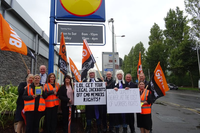 On 4 May 2017, an industrial tribunal in London ruled that the British trade union GMB may organize a ballot for establishing employee representation for the 273 employees in Lidl's warehouse in Bridgend (Wales). GMB filed a complaint with the Central Arbitration Committee (CAC) in London in March 2016 after management had persistently refused and won their case. Lidl appealed before the High Court of England and Wales and lost again. Now the appeal against this has also been rejected. Lidl has 637 discount stores in Britain, which are supplied by eleven regional warehouses, and wants to expand extensively. The number of stores is to rise to 1,500.
On 4 May 2017, an industrial tribunal in London ruled that the British trade union GMB may organize a ballot for establishing employee representation for the 273 employees in Lidl's warehouse in Bridgend (Wales). GMB filed a complaint with the Central Arbitration Committee (CAC) in London in March 2016 after management had persistently refused and won their case. Lidl appealed before the High Court of England and Wales and lost again. Now the appeal against this has also been rejected. Lidl has 637 discount stores in Britain, which are supplied by eleven regional warehouses, and wants to expand extensively. The number of stores is to rise to 1,500. On 26 July 2017, the High Court of Justice ruled that tribunal fees, levied since July 2013, are unconstitutional. The government must reimburse some 27 to 32 million £s in tribunal fees to thousands of plaintiffs. The judgement was obtained by Unison, the second largest single trade union in the TUC and which has a predominant presence in the public services sector.
On 26 July 2017, the High Court of Justice ruled that tribunal fees, levied since July 2013, are unconstitutional. The government must reimburse some 27 to 32 million £s in tribunal fees to thousands of plaintiffs. The judgement was obtained by Unison, the second largest single trade union in the TUC and which has a predominant presence in the public services sector. A EWC agreement was signed on 4 May 2017 at the headquarters of Tereos in Origny-Sainte-Benoite (Picardy). The world's third largest sugar manufacturer belongs to 12,000 farmers. European forums had already existed in sub-divisions of the company on a "voluntary" basis since 1995. For the first time, the whole company is now covered and the EWC is subject to the current EU Directive. A Special Negotiating Body had been established for the purpose.
A EWC agreement was signed on 4 May 2017 at the headquarters of Tereos in Origny-Sainte-Benoite (Picardy). The world's third largest sugar manufacturer belongs to 12,000 farmers. European forums had already existed in sub-divisions of the company on a "voluntary" basis since 1995. For the first time, the whole company is now covered and the EWC is subject to the current EU Directive. A Special Negotiating Body had been established for the purpose. EWC already established before spin-off
EWC already established before spin-off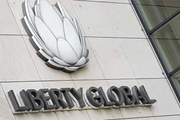 A EWC agreement was concluded on 13 June 2017 for Liberty Global, the world's largest cable TV and broadband operator. The company which was founded in 2005, is based in London and as a consequence of the step-by-step acquisition of regional and national cable operators has today a presence in twelve European countries. The largest number of employees outside the United Kingdom is to be found in the Netherlands. In view of the threatening Brexit, Dutch jurisdiction was consequently chosen for the EWC agreement.
A EWC agreement was concluded on 13 June 2017 for Liberty Global, the world's largest cable TV and broadband operator. The company which was founded in 2005, is based in London and as a consequence of the step-by-step acquisition of regional and national cable operators has today a presence in twelve European countries. The largest number of employees outside the United Kingdom is to be found in the Netherlands. In view of the threatening Brexit, Dutch jurisdiction was consequently chosen for the EWC agreement. The health-care provider Phoenix from Mannheim has been avoiding any supervisory board-level participation since it was founded in 1994. At the time, the billionaire family Merckle had acquired five regional pharmaceutical wholesalers in Germany and subsequently expanded massively throughout Europe. Today the Phoenix Pharma SE has 34,000 employees in 26 countries throughout Europe (including 4,400 in Germany) and runs 2,000 pharmacies in 13 countries. Initially it was the choice of the legal form which ensured that the company did not fall under codetermination laws. In January 2014, the general partnership was then shifted to Liechtenstein to continue avoiding any codetermination. The return to Mannheim was carried out in the European Company (SE) legal form. For this purpose, the Merckle group founded an SE in August 2016 with no employees, which became the parent company of Phoenix on 7 April 2017. By these means, the supervisory board will remain permanently free of any employee representation.
The health-care provider Phoenix from Mannheim has been avoiding any supervisory board-level participation since it was founded in 1994. At the time, the billionaire family Merckle had acquired five regional pharmaceutical wholesalers in Germany and subsequently expanded massively throughout Europe. Today the Phoenix Pharma SE has 34,000 employees in 26 countries throughout Europe (including 4,400 in Germany) and runs 2,000 pharmacies in 13 countries. Initially it was the choice of the legal form which ensured that the company did not fall under codetermination laws. In January 2014, the general partnership was then shifted to Liechtenstein to continue avoiding any codetermination. The return to Mannheim was carried out in the European Company (SE) legal form. For this purpose, the Merckle group founded an SE in August 2016 with no employees, which became the parent company of Phoenix on 7 April 2017. By these means, the supervisory board will remain permanently free of any employee representation. An SE participation agreement was signed for Drees & Sommer on 23 January 2017 in Stuttgart. The consulting firm has been operating as an SE since 26 April 2017. The entire company equity is in the hands of the currently or formerly active company executives who have made a considerable contribution to the success of the company. At the time of the SE conversion there were 1,835 employees in Germany and altogether fewer than 100 in seven further EU Member States.
An SE participation agreement was signed for Drees & Sommer on 23 January 2017 in Stuttgart. The consulting firm has been operating as an SE since 26 April 2017. The entire company equity is in the hands of the currently or formerly active company executives who have made a considerable contribution to the success of the company. At the time of the SE conversion there were 1,835 employees in Germany and altogether fewer than 100 in seven further EU Member States. The German financial services provider MLP, based in Wiesloch (near Heidelberg) has been operating as a SE since 22 September 2017. The financial sales company with a license for banking has 1,941 employees in Germany and six in Luxembourg. Through its conversion to a SE, the management used the possibility of permanently avoiding full-parity codetermination which is legally prescribed in Germany starting from 2,000 employees. The SE participation agreement concluded on 19 July 2017, freezes one-third participation: as previously, a general election of all employees will be held to elect two of the six member supervisory board. In the future the employees in Luxembourg will also have the right to vote.
The German financial services provider MLP, based in Wiesloch (near Heidelberg) has been operating as a SE since 22 September 2017. The financial sales company with a license for banking has 1,941 employees in Germany and six in Luxembourg. Through its conversion to a SE, the management used the possibility of permanently avoiding full-parity codetermination which is legally prescribed in Germany starting from 2,000 employees. The SE participation agreement concluded on 19 July 2017, freezes one-third participation: as previously, a general election of all employees will be held to elect two of the six member supervisory board. In the future the employees in Luxembourg will also have the right to vote. An employee charter was signed for DS Smith between the European works council and central management on 3 April 2017 at their headquarters in London. It applies to 26,000 employees in 36 countries worldwide, including 500 from outside Europe. Unlike international framework agreements, which are aimed at locations in other parts of the world, for DS Smith the focus lies on Europe. The charter contains action plans with 16 concrete measures in the fields of occupational health and safety, respect of human rights, fair practice in personnel and social policy as well as for promoting skills development.
An employee charter was signed for DS Smith between the European works council and central management on 3 April 2017 at their headquarters in London. It applies to 26,000 employees in 36 countries worldwide, including 500 from outside Europe. Unlike international framework agreements, which are aimed at locations in other parts of the world, for DS Smith the focus lies on Europe. The charter contains action plans with 16 concrete measures in the fields of occupational health and safety, respect of human rights, fair practice in personnel and social policy as well as for promoting skills development. A joint declaration on teleworking for Generali was signed between their European works council and central management at a meeting held on 16 May 2017 in Munich. In the future, all European subsidiaries should intensify their efforts to promote innovative measures ("Smart Working"), to help create an agile organization and develop new skills. In some countries, e.g. Austria, company agreements on teleworking already provide office workers with the opportunity of carrying out their work in a decentralized manner i.e. from home.
A joint declaration on teleworking for Generali was signed between their European works council and central management at a meeting held on 16 May 2017 in Munich. In the future, all European subsidiaries should intensify their efforts to promote innovative measures ("Smart Working"), to help create an agile organization and develop new skills. In some countries, e.g. Austria, company agreements on teleworking already provide office workers with the opportunity of carrying out their work in a decentralized manner i.e. from home. An addendum to the SNCF's EWC agreement was signed on 29 June 2017 in Paris. It had been concluded for the entire company for the first time in December 2012. Previously there were EWC bodies only in two subsidiaries (see
An addendum to the SNCF's EWC agreement was signed on 29 June 2017 in Paris. It had been concluded for the entire company for the first time in December 2012. Previously there were EWC bodies only in two subsidiaries (see  Sodexo's central management in Paris signed a Joint Commitment on 21 June 2017 with the International Union of Foodworkers (IUF) providing measures for the prevention of sexual harassment. The French group does business in the field of community catering and facilities management and has 425,000 employees in 80 countries around the globe. The Joint Commitment builds on the international framework agreement from 2011 (see
Sodexo's central management in Paris signed a Joint Commitment on 21 June 2017 with the International Union of Foodworkers (IUF) providing measures for the prevention of sexual harassment. The French group does business in the field of community catering and facilities management and has 425,000 employees in 80 countries around the globe. The Joint Commitment builds on the international framework agreement from 2011 (see  The FAIR committee of Total, the French petroleum group, held their second meeting in Casablanca (Morocco) on 11 July 2017. The committee supervises compliance to the international framework agreement that was concluded in January 2015 with the trade unions (see
The FAIR committee of Total, the French petroleum group, held their second meeting in Casablanca (Morocco) on 11 July 2017. The committee supervises compliance to the international framework agreement that was concluded in January 2015 with the trade unions (see  On 2 October 2017, the London based on-line fashion retailer ASOS (As Seen On Screen) signed a framework agreement which is applicable worldwide with the Global Union federation industriALL. It is the first one ever in the e-commerce sector. The 4,000 employees of ASOS now have the legal right to join trade unions and to establish employee representative bodies. In addition, the agreement covers the entire supply chain, in particular the workers in developing countries who manufacture ASOS own-brand clothing. The British on-line retailer is hereby taking a completely different policy stance than its German competitor Zalando, who has purposefully excluded any trade unions and willingly accepts the risk of legal action (see
On 2 October 2017, the London based on-line fashion retailer ASOS (As Seen On Screen) signed a framework agreement which is applicable worldwide with the Global Union federation industriALL. It is the first one ever in the e-commerce sector. The 4,000 employees of ASOS now have the legal right to join trade unions and to establish employee representative bodies. In addition, the agreement covers the entire supply chain, in particular the workers in developing countries who manufacture ASOS own-brand clothing. The British on-line retailer is hereby taking a completely different policy stance than its German competitor Zalando, who has purposefully excluded any trade unions and willingly accepts the risk of legal action (see  During 2015 and 2016, trade unions from Spain, Ireland and Bulgaria took part in the I.T.E.M. project organized by the Italian trade union CGIL with financial backing from the EU. It included three seminars in each of the four countries involved and a transnational workshop for EWC members. It was concluded by a European conference where a trainers' manual in the languages of the four countries involved was presented. The project developed its own website.
During 2015 and 2016, trade unions from Spain, Ireland and Bulgaria took part in the I.T.E.M. project organized by the Italian trade union CGIL with financial backing from the EU. It included three seminars in each of the four countries involved and a transnational workshop for EWC members. It was concluded by a European conference where a trainers' manual in the languages of the four countries involved was presented. The project developed its own website.
 Seven unions from the finance industry have joined together to found the umbrella federation NFU, with a view to representing the common interests of their 150,000 members before the EU. Its core demands include a long-term and sustainable finance industry, constructive social dialogue, legally guaranteed rights to collective bargaining and a value-based human resources policy in the banking and insurance sectors. The NFU is also actively supporting the development of trade unions in Estland's financial sector.
Seven unions from the finance industry have joined together to found the umbrella federation NFU, with a view to representing the common interests of their 150,000 members before the EU. Its core demands include a long-term and sustainable finance industry, constructive social dialogue, legally guaranteed rights to collective bargaining and a value-based human resources policy in the banking and insurance sectors. The NFU is also actively supporting the development of trade unions in Estland's financial sector.




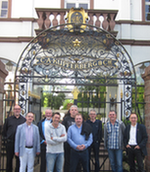 The annual data protection seminar was held from 3 to 5 July 2017. The main focus was the General Data Protection Regulation which will replace the German Federal law on Data Protection in May 2018. The rules for the processing of personal data will then be unified across all EU Member States. The supporting program of the seminar included a visit to the Kupferberg terrace (photo), which is the deepest sparkling wine cellar in the world. The seminar will be organized once again from 2 to 4 July 2018 in the same venue. Now that the countdown has started, works councils members should not wait too long and tackle the subject without delay. At short notice, we are therefore proposing a set of one-day seminars in autumn 2017, in several cities: inter alia in Munich, Frankfurt/Main, Cologne, Dortmund and Hamburg.
The annual data protection seminar was held from 3 to 5 July 2017. The main focus was the General Data Protection Regulation which will replace the German Federal law on Data Protection in May 2018. The rules for the processing of personal data will then be unified across all EU Member States. The supporting program of the seminar included a visit to the Kupferberg terrace (photo), which is the deepest sparkling wine cellar in the world. The seminar will be organized once again from 2 to 4 July 2018 in the same venue. Now that the countdown has started, works councils members should not wait too long and tackle the subject without delay. At short notice, we are therefore proposing a set of one-day seminars in autumn 2017, in several cities: inter alia in Munich, Frankfurt/Main, Cologne, Dortmund and Hamburg.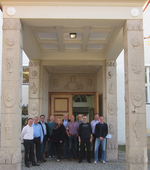 Conference for works council members in US companies
Conference for works council members in US companies Negotiations for a EWC agreement for Rockwell Collins between their EWC steering committee and central management were concluded at their European headquarters in Toulouse airport, on 26 and 27 September 2017 (photo). The company manufactures control and navigation systems for aviation and had acquired the supplier B/E Aerospace in April 2017. As a result, the workforce at Rockwell Collins was doubled to 3,500 in Europe.
Negotiations for a EWC agreement for Rockwell Collins between their EWC steering committee and central management were concluded at their European headquarters in Toulouse airport, on 26 and 27 September 2017 (photo). The company manufactures control and navigation systems for aviation and had acquired the supplier B/E Aerospace in April 2017. As a result, the workforce at Rockwell Collins was doubled to 3,500 in Europe. The new SE works council of Tom Tailor, the fashion retailer, held their plenary meeting at their headquarters in Hamburg on 27 and 28 September 2017, during which the EWC Academy provided their first training. The representatives from eleven countries represent 6,600 employees. The SE participation agreement was signed in July 2016 and provides for a full-parity supervisory board (see
The new SE works council of Tom Tailor, the fashion retailer, held their plenary meeting at their headquarters in Hamburg on 27 and 28 September 2017, during which the EWC Academy provided their first training. The representatives from eleven countries represent 6,600 employees. The SE participation agreement was signed in July 2016 and provides for a full-parity supervisory board (see  A seminar is being held from 18 to 20 October 2017 in Gdańsk. It is addressed to works council members who are confronted with the relocation of business units (Shared service centres) to Central and Eastern Europe. It will provide the possibility for exchanging experience on how to handle such relocations. Labour relations in Poland and the role of Polish members in the EWC will also be covered.
A seminar is being held from 18 to 20 October 2017 in Gdańsk. It is addressed to works council members who are confronted with the relocation of business units (Shared service centres) to Central and Eastern Europe. It will provide the possibility for exchanging experience on how to handle such relocations. Labour relations in Poland and the role of Polish members in the EWC will also be covered. The rules for the processing of personal data in the EU are to be unified in 2018. The General Data Protection Regulation will replace all previous national legislations as of 25 May 2018. The German Federal Law on Data Protection will then no longer apply. Due to the urgent need for works council members to act, we are organizing several one-day events in autumn 2017, in seven cities.
The rules for the processing of personal data in the EU are to be unified in 2018. The General Data Protection Regulation will replace all previous national legislations as of 25 May 2018. The German Federal Law on Data Protection will then no longer apply. Due to the urgent need for works council members to act, we are organizing several one-day events in autumn 2017, in seven cities. As every year in January, a two-day conference is being held in Hamburg, including this time a visit to the new Elbe Philharmonic Hall (photo). The conference will be simultaneously interpreted (German - English).
As every year in January, a two-day conference is being held in Hamburg, including this time a visit to the new Elbe Philharmonic Hall (photo). The conference will be simultaneously interpreted (German - English).